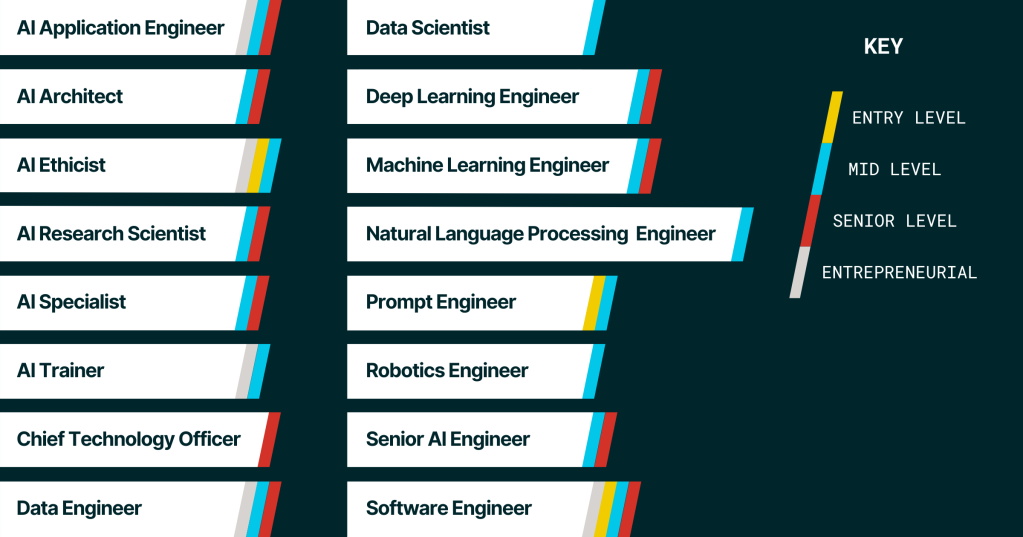Advancements in artificial intelligence (AI) have paved the way for the expansion and transformation of many industries. As an AI professional, you will immerse yourself in a dynamic field at the forefront of innovation. This is a field for people that like to tackle complex challenges and make a significant impact in shaping the future.

Let’s review this skill set together by discussing how AI expertise can be acquired, applied, and transformed into a fulfilling career.
What can I do with AI skills?
AI professionals perform a wide range of tasks depending on their specific roles and expertise. Let’s delve into several key responsibilities typically associated with individuals possessing AI skills.
Develop AI technologies — Design and build AI systems and solutions. This may include data preprocessing, AI model training, computer programming, and deployment.
Optimize AI technologies — Evaluate AI systems and fine-tune them to improve model performance or efficiency. The process may consist of data collection, data analysis, and algorithm improvement.
Assist in the adoption of AI technologies — Help organizations adopt AI technologies by training employees on technologies and best practices. This often involves working with cross-functional teams and advocating for fairness, transparency, and accountability.
Utilize AI technologies — Make use of and refine the processes for utilizing AI technologies. This includes keeping up with the latest developments in AI to incorporate cutting-edge approaches.
Listen as Software Engineer Emmanuel Klu, shares how he contributes to the Responsible & Human-Centered AI team at Google.

I am situated in the responsible AI organization in Google research, and there the focus is thinking about how we build technology responsibly, which also includes how to leverage technology for social good. So social impact is kind of a core tenant of building responsibly. At the same time, we do a lot of ethical consideration and development of machine learning systems and products. We work a lot across different product areas at Google, like Search and Maps. Basically anywhere where machine learning is deployed, which is everywhere these days. And we also do a lot of foundational and applied research, and looking ahead—looking at longer time scales. How might we consider how to evaluate machine learning systems for fairness, for example. What are techniques to evaluate and also mitigate issues that we find. So it’s a mix of the foundational research, working with ethicists, professors, researchers at various institutions, really digging deep into keeping pace with the developments that are happening in AI, but also translating some of the insights that we found into actual products.
Discover your career opportunities
As AI technology advances and grows in popularity, so do the job opportunities. Here are a few job titles available to individuals with AI skills:

Since AI is a relatively young field, there is limited established convention for companies to follow when assigning titles to their job postings. Thus, it is important to carefully read job descriptions when exploring job opportunities in AI. AI technology originates from the domains of data and computer science, so you will see many job postings with conventional titles from those fields, such as data scientist or software engineer. Other job postings search for experts with specific AI skills, such as natural language processing engineer. In short, always read the job description of AI job postings to understand the expectations fully.
Expert advice
“AI is poised to soar in demand, creating a remarkable opportunity for those who grasp its potential. So the more you learn about this innovative technology, the better off you will be in the long run. As AI’s significance continues to surge, your knowledge and expertise will become invaluable. And you will be able to grow with one of the fastest growing industries out there.”
— Elizabeth Mimms, career expert at edX

How can I acquire AI skills and turn them into a career?
If developing AI skills interests you, we recommend taking these steps:
Research is key when it comes to any career, and a career in AI is certainly no exception. Take advantage of all the information out there, whether through browsing the internet for job titles, listening to tech-relevant podcasts, or getting connected to professionals in the areas or positions that interest you.
Pro tip:
Explore your career possibilities. As part of your research, take every opportunity to learn more about topics in your desired field. Browse the edX course catalog at edx.org to see what AI-related topics, courses, and programs interest you, and start building your AI skills today.
One key part of the research phase is networking. This simple step is often overlooked and undervalued but can significantly impact your career trajectory. To clarify your career goals and aspirations, you must talk with professionals about what the work looks like.
You open a door of opportunity in your career by reaching out to professionals in your targeted fields, positions, and companies. Connecting with AI professionals who could vouch for you and provide hard-to-find intel about the industries or organizations of interest is invaluable.
Pro tip:
We highly recommend scheduling informational interviews to learn from and connect with AI professionals and hiring managers to gather information. These contacts can help you learn new skills, offer advice, and share job opportunities.
Check out our Networking guide and Networking outreach templates and resources for help getting started.
To supplement your understanding of what others are doing professionally, gain clarity on your own goals and aspirations. Ask yourself what about AI interests you — the possibilities are endless.
An important question to ask yourself is: Am I most interested in developing AI tools or utilizing AI tools? Your response will determine which AI skills will best serve your career.
Skill set for developing AI tools
For those interested in developing AI tools, you will need to acquire a combination of data, math, engineering, and computer programming skills. AI tools are built using code and data, so it is essential that AI professionals have strong technical skills. The list below encompasses several of these technical skills:
- Data science
- Deep learning
- Machine learning
- Natural language processing
- Neural networks
- Programming (Python, R, SQL)
- Visual image recognition
Proficiency in these skills will position you to apply for highly technical positions, such as AI architect, machine learning engineer, and software engineer.
Skill set for utilizing AI tools
For those interested in utilizing AI tools, you must become an expert in the specific technologies and domains that you plan to work with. View the list below for examples of these skills:
- AI ethics
- Data analysis
- Prompt engineering
- Software development
These skills are especially relevant for AI ethicists, AI project managers, and prompt engineers.
Transferable skills:
Transferable skills are skills you carry from one job to another, enhancing your adaptability and versatility. Here are a few transferable skills that complement AI skills well: adaptability, self-motivated work style, creative problem-solving, decision-making, morality and ethics.
You can learn AI skills in a variety of ways. Consider which route best fits your needs and learning style. Here are a few options to consider:
Self-education — If you want to learn asynchronously, informally, or casually, self-education is a great place to start. Many approaches to this learning style support career goals, budgets, learning styles, and time commitments. Here are some to consider:
- Informal opportunities: Gain a greater understanding of AI by reading. Explore books, articles, and even research papers to expand your AI knowledge and learn what’s happened or is happening in the field. Not a reader? Plenty of videos, podcasts, and other forms of multimedia can teach you about careers or work related to AI.
- Online courses: If you prefer a more structured or socialized learning experience, online courses might be a good option. edX.org offers several instructor-led and self-paced AI courses that may be of interest.
- Professional certifications: When you want a less casual learning experience but don’t have needs that warrant a boot camp or degree, professional certifications may be the best fit for you. Professional certifications are a great addition to your resume and prove your technical skills for roles in AI. edX.org offers many certificate programs that may interest you.
Boot camps — Experienced curriculum teams design these innovative programs to help you achieve your career goals in a fraction of the time it takes to complete a traditional degree. With many boot camps lasting just 3–12 months, you’ll be amazed at how quickly you can gain the knowledge and expertise you need to launch your dream career. You can kickstart a career in AI by taking an AI, data, or computer science boot camp. Explore popular boot camps on edX.org.
Degree programs — If you do not have career experience in data science, math, engineering, or computer science, you may want to consider a degree program. Many AI-related positions require advanced technical skills, and degree programs can be an efficient way to acquire these skills. Computer science, statistics, and data science are popular degree programs among AI professionals.
The technical hiring process is different from those of non-technical fields in two ways:
- Many employers require a portfolio of projects, such as course projects, personal projects, and professional projects. You’ll want to build a competitive online portfolio highlighting your skills and unique value.
- Most technical hiring processes involve a technical screening. This is a stage in the interview process where the employer assesses a candidate’s technical skills. It may sound intimidating at first but remember that the employer wants you to succeed. They hope to find a great candidate, and that candidate could be you.
Helpful resources:
The career team at edX has resources and workshops to help you fine-tune your application materials and prepare for technical interviews. Start with our Technical screening guide.
Once you achieve your AI career goal, celebrate your success. The career journey is full of ups and downs, and every victory deserves acknowledgment.
With that said, your journey doesn’t end here — it’s only just beginning. Give yourself grace and understand that careers are not linear. Here are some ways you could continue growing your AI skills.
Continued learning — Always reference our course catalog on edX.org for continued learning opportunities. It never hurts to brush up on your skills, expand your knowledge within the industry, or learn about other subjects that could apply to your work, interests, or something in between.
Promotions — As AI technologies continue to grow, so will career opportunities. To position yourself well for promotions, you will need to stay current on AI technologies and trends, and develop leadership skills.
Promotions in AI:
Here are a few senior roles that you may want to work toward as you advance your career in AI:
AI architect: Designs and develops the overall structure and framework of AI systems while considering performance metrics and business objectives.
AI principal scientist: Leads cutting-edge research initiatives and provides strategic guidance for developing AI technologies.
Chief technology officer: Oversees an organization’s technological vision, strategy, and direction.
Pivots — Make sure to regularly check in with yourself and your satisfaction with daily tasks. If you are dissatisfied in your current role, take stock of what you like and dislike about it, keep your eyes out for company-sponsored growth opportunities, and pursue career pivots that optimize your background, skill set, and interests.
What could my career look like with an AI skill set?
It is difficult to say exactly what your life would look like with an AI skill set, but we can provide some insight. Consider how these may factor into your life plan:
Remote work options — Cloud technologies allow many tech professionals to work remotely. If you are looking for remote work, you can likely find opportunities in AI roles.
Opportunity to make an impact — AI has the potential to positively impact most industries, including healthcare, transportation, and cybersecurity. Consider how you could use AI skills to prevent disease, improve driver safety, or secure personal data.
Life-long learning — AI professionals must stay up-to-date on innovations in AI technologies. Since AI is a relatively new technology, AI professionals can expect a career that provides many learning opportunities.
Expert advice
“Whether you are a technical writer, artist, or software engineer, you have to start embedding AI in your work. There are many opportunities to use these technologies to advance your career.”
— Sandeep Singh, head of applied AI/computer vision at Beans.ai

What are my next steps?
Learn more about AI:
Register for a course on edX to learn about a variety of topics within the field of AI, such as AI for Everyone: Master the Basics, Prompt Engineering and Advanced ChatGPT, Google AI for Anyone, and AI for Leaders.
Watch a session:
Watch a relevant session on our Events page to learn more about tech and other professionals’ experiences within it.








